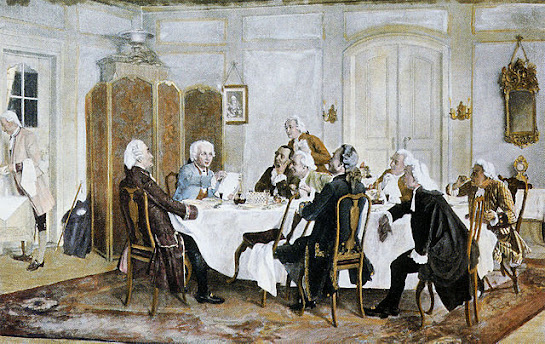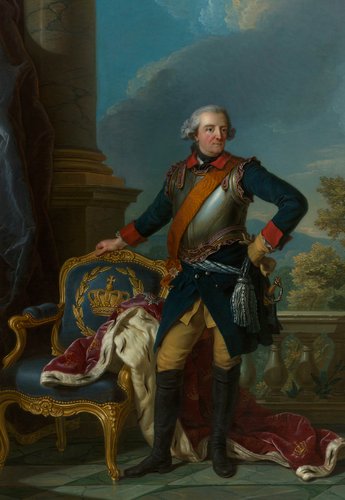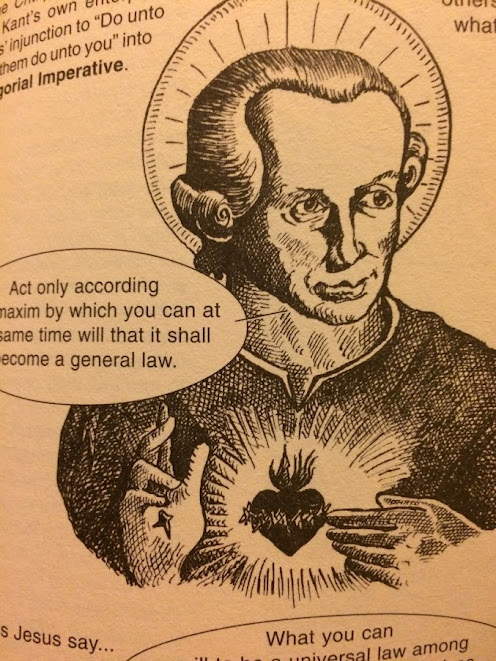"What is Enlightenment?" - Analysis of Immanuel Kant's Essay
Immanuel Kant's essay What is Enlightenment? is a very accessible and clear formulation of the core tenets of the political and philosophical movement known as the 18th Century "Enlightenment." This word, enlightenment, has a history of its own by the time it is used by Kant and others. We first saw this word appear in the writings of Plato. Enlightenment, in that context, was the process by which we leave the "Cave." It was the realization that the world of the senses and body is a fleeting one, and that the most real was the world of the mind and eternal essences. The role of the philosopher was to transcend his own limited knowledge of the sensual world and proceed to live according to the highest ideals of the soul. This was enlightenment. With that as a background, we can see Kant's essay as a claim that not only the individual must go through this process, personally, but that humanity as a whole must undergo it, with the role of the state as ensuring and reflecting this common enlightenment. This begs the question, though, what does Kant consider to be the enlightenment of humanity?
What is Enlightenment?
Kant begins this essay with a lashing criticism of the past centuries, taking aim at both the state monarchies and the guidance of the Church on the people. He introduces the idea of "nonage." Nonage is the perpetuation of the dependence of childhood. It is the refusal to use one's own mind to think and confront the world for oneself. It is to depend on others to tell you what to think and how to live; a result of laziness and cowardice on the part of the common man. He has the government to tell him how to live, the priest to guide his conscience, the doctor to tell him what to eat, and people to pay to do difficult tasks for him. This is wrong, though! Kant says that the motto of the Enlightenment must be "Dare to Know! 'Have courage to use your own understanding.'"
Kant claims that the average man is not aided in this process, though, either. Rather those who are in control of the masses want to make it seem that to think for oneself or govern oneself would be a very dangerous and impossible thing to do. They actively try to discourage this. To the point in which this nonage has been so ingrained in the people that they are not fully conscious of its presence. "Dogmas and formulas, these mechanical tools designed for reasonable use - or rather abuse - of his natural gifts, are the fetter of an everlasting nonage."
Now contrary to what one might think, the revolutionary transition to enlightenment cannot happen overnight or by violent overthrow. Such things only work for a minute, and eventually perpetuate the same problems that existed before, just with new faces representing them. Rather, this revolution has to be one which changes the minds and hearts of the masses. Thus, it is a slow revolution. What must happen for such a revolution of mind to occur? There must be the public freedom of thought and speech. While there are duties that man must obey to preserve the stability of the civic order, he must always be allowed to speak his mind to the public. Such a simple freedom will transform the population, he thinks. He makes a distinction between the public world sphere, in which ideas can be freely traded and argued, and the private posts and duties of one's individual life which must be fulfilled, lest society fall apart. In man's private life he must continue to follow and obey his duties, yet as a scholar he must be able to write and express himself freely.
Enlightenment ... and Religion?
Now, besides the political system of monarchy, what would stand in the way of Kant's vision of enlightenment? Next, in his essay, he addresses what he sees as a problem to this new revolution, religious dogma. Dogmas are, by nature, things that are revealed by God and therefore unchanging and eternal. Kant's worry with this is that previous ages of humanity will bind the future by these dogmas and prevent the ability of the future generations to reject it, or to progress in their own way through reason. He says that it's possible to establish such a dogma for a period of time, but only if it will give way at the proper moment. There can be an interplay between those attached to the past and those advocating for change in the future, but society cannot be cemented into place by dogma. This is to do violence to the human nature of reason, and to remain in nonage, in Kant's opinion."But should a society of ministers, say a Church Council, . . . have the right to commit itself by oath to a certain unalterable doctrine, in order to secure perpetual guardianship over all its members and through them over the people? I say that this is quite impossible. Such a contract, concluded to keep all further enlightenment from humanity, is simply null and void even if it should be confirmed by the sovereign power, by parliaments, and the most solemn treaties. An epoch cannot conclude a pact that will commit succeeding ages, prevent them from increasing their significant insights, purging themselves of errors, and generally progressing in enlightenment. That would be a crime against human nature whose proper destiny lies precisely in such progress. Therefore, succeeding ages are fully entitled to repudiate such decisions as unauthorized and outrageous."
Likewise, Kant advocates for a transition from a period of time in which religion was held as something more collective, connected to the identity of a people and its ruler, to a move towards religion becoming the private business of each man in which the ruler's only duty is to guarantee each man freedom of their religious conscience. This is to become enlightened, to allow each man to decide these issues for himself. If men are allowed the freedom to work out issues and ideas on their own, they will take ownership of their own condition and make things work. Again, this is the slow process. It will actually take a strong ruler to, at once, keep the civic order the same, while allowing freedom of thought and print to begin to free the individual's mind from nonage. Only after the transformation of man's mind will he then be ready to accept the whole responsibility of freedom and the possibility of self-governance.
Reflection
Here are some of my personal thoughts on the essay. Surely I believe in the power and brilliance of man's ability to reason, and the dialectical process which he goes through age by age in purifying the truths which he comes up with. After all, this is the discipline of philosophy in a nutshell. My problem lies, though, in the idea that there can be no eternal or universal truths. It seems to me that Kant is rejecting the idea that the world has a built in teleology to it. This would be in accord with his metaphysical skepticism, as metaphysics and teleology are tied together. Likewise, to also reject the possibility of God revealing truths to humanity through religion, is to also do away with religious teleology. But if there is no end towards which to progress for humanity, no clear goal, no way to say that this end is better than that end, what have we really accomplished? "Progress" without teleology seems to be to be community suicide. to be the spinning of one's wheels in place. Reason would then not uncovering the truths of the world, but agreeing together on what they should be. Thus, we have overthrown a metaphysical or religious nonage only to accept a man-made nonage which is decided by majority vote.





Comments
Post a Comment